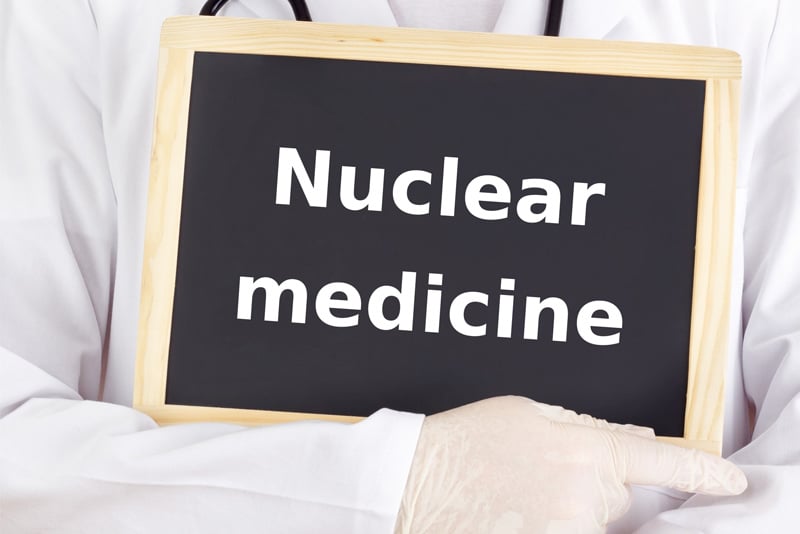Nuclear medicine is a part of radiology specialty that uses small amounts of radioactive tracers or radiopharmaceuticals to assess bodily functions, and to diagnose and treat disease. This nuclear imaging procedure allows visualization of organ and tissue structure as well as function. Some of the diseases treated with nuclear medicine procedures are hyperthyroidism, thyroid cancer, lymphomas, and bone pain from some types of cancer. Radiologists can report these procedures on the medical claims using relevant CPT codes to get proper reimbursement. Consider partnering with an experienced radiology medical coding company to streamline the code assignment process and submit claims on-time.
Also referred to as radionuclide, radioactive tracers are absorbed by body tissue. Specially designed gamma cameras are used to track the path of these tracers. Two most common imaging modalities in nuclear medicine are – Single Photon Emission Computed Tomography (SPECT) and Positron Emission Tomography (PET) scans. The major difference between these scans is the type of radiotracers used. While SPECT scans measure gamma rays, radiotracers used with PET scans produce small particles called positrons. SPECT scans are primarily used to diagnose and track the progression of heart disease, such as blocked coronary arteries, while PET scans are used to detect cancer and monitor its progression, response to treatment, and if it has metastasized.
Nuclear Medicine – Common Clinical Applications
While diagnostic X-rays are meant to study anatomy, nuclear medicine is used to study organ and tissue function. Some of the common clinical applications of nuclear medicine discussed by WHO are – bone scan to evaluate metabolic activity of the bones mainly for arthritis or fractures, myocardial perfusion scan to compare the blood flow to the myocardium for differentiation of ischemia and infarction, renal scan to determine the perfusion and drainage of the kidneys, lung scan (VQ) to compare ventilation and perfusion of the lungs to diagnose pulmonary embolism and thyroid scan to assess the appearance and function of the thyroid gland.
The tracer emits gamma radiation, which is then imaged using a gamma camera. The gamma camera consists of a radiation sensitive crystal which detects the distribution of the tracer within the patient’s body. The information is converted to a digital format to produce a two- or three-dimensional image on a screen. Advanced gamma cameras are available that are hybrid machines including a CT to allow for fusion of Nuclear Medicine and CT images.
CPT Codes to Report Nuclear Medicine Procedures
78012-78099 Diagnostic Nuclear Medicine Procedures on the Endocrine System
- 78012 Thyroid uptake, single or multiple quantitative measurement(s) (including stimulation, suppression, or discharge, when performed)
- 78020 Thyroid Carcinoma Metastases Uptake
- 78070 Parathyroid planar imaging (including subtraction, when performed)
- 78075 Adrenal Nuclear Imaging
78102-78199 Diagnostic Nuclear Medicine Procedures on the Hematopoietic, Reticuloendothelial and Lymphatic System
- 78102 Bone Marrow Imaging, Limited
- 78140 Labeled Red Cell Sequestration
- 78185 Spleen Imaging With & Without Vascular Flow
- 78195 Lymph System Imaging
78201-78299 Diagnostic Nuclear Medicine Procedures on the Gastrointestinal System
- 78202 Liver Imaging With Flow
- 78215 Liver & Spleen Imaging
- 78261 Gastric Mucosa Imaging
- 78290 Meckel’s Diverticulum Imaging
78300-78399 Diagnostic Nuclear Medicine Procedures on the Musculoskeletal System
- 78300 Bone or Joint Imaging Limited
- 78305 Bone or Joint Imaging Multiple
- 78315 Bone Scan 3 Phase Study
- 78320 Bone Joint Imaging Tomo Test SPECT
78414-78499 Diagnostic Nuclear Medicine Procedures on the Cardiovascular System
- 78414 Non-Imaging Heart Function
- 78428 Cardiac Shunt Imaging
- 78456 Acute Venous Thrombosis Imaging
- 78458 Venous Thrombosis Images, Bilateral
78579-78599 Diagnostic Nuclear Medicine Procedures on the Respiratory System
- 78579 Pulmonary ventilation imaging (e.g., aerosol or gas)
- 78580 Pulmonary perfusion imaging (e.g., particulate)
- 78582 Pulmonary ventilation (e.g., aerosol or gas) and perfusion imaging
- 78597 Quantitative differential pulmonary perfusion, including imaging when performed
78600-78699 Diagnostic Nuclear Medicine Procedures on the Nervous System
- 78601 Brain Limited Imaging and Flow
- 78630 Cisternogram (Cerebrospinal Fluid Flow)
- 78647 Cerebrospinal Fluid Scan (Tomographic) SPECT
- 78699 Unlisted Nuclear Medicine Procedures on the Nervous System
78700-78799 Diagnostic Nuclear Medicine Procedures on the Genitourinary System
- 78708 Kidney Imaging Single Study With Pharmacological Intervention
- 78725 Kidney Function Study – Non-Imaging Radioisotopic
- 78730 Urinary Bladder Residual Study
- 78740 Ureteral Reflux Study
78800-78999 Other Diagnostic Nuclear Medicine Procedures
- 78801 Radiopharmaceutical Localization of Tumor, Multiple Areas
- 78803 Radiopharmaceutical Localization of Tumor Tomographic (SPECT)
- 78806 Radiopharmaceutical Localization of Abscess, Whole Body
- 78999 Unlisted procedure, diagnostic nuclear medicine-radiation therapy treatment planning
For most of these radiology procedures, most insurers require prior authorization. The medical coding staff must be knowledgeable in using the appropriate modifiers along with the CPT codes to report radiology services. Busy practices can outsource their coding tasks to a professional medical billing company which provides the service of AAPC- or AHIMA- certified coders.




